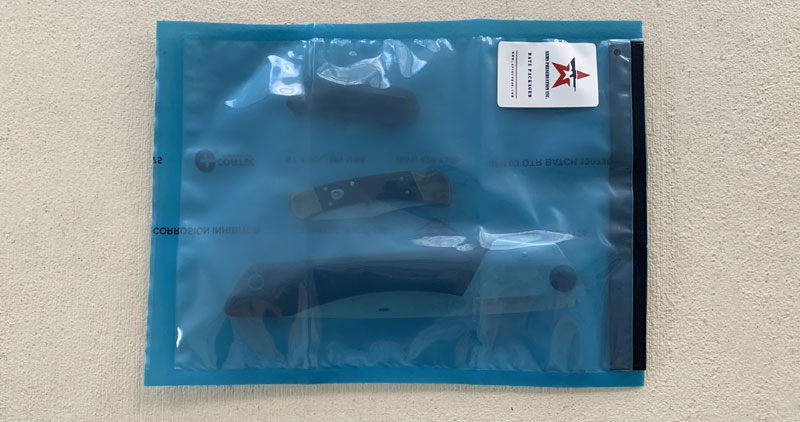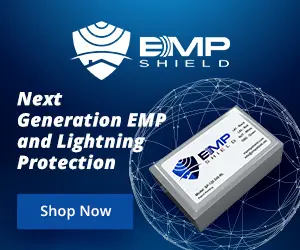
The Best Anti-Corrosive Bags for Long Term Storage
Prepping means thinking about the future.
If you've made significant investments in emergency preparedness items, it makes a lot sense to have a plan to store them properly, especially those items which might need to sit long term.
Electronics like radios, batteries, lanterns, flashlights, computers, or any other metal items like knives, weapons & ammunition, scopes or binoculars, or even any family heirlooms should all be protected when stored.
That's because over time corrosion (oxidation) can set in on metal surfaces and ruin them to the point of failure if left unprotected or even protected improperly.
What that all essentially means is, you have to stop the chemical process which causes rusting to occur.
However, that's not as simple of a process as it may seem. Merely wrapping something up in a paper bag, or a towel or even a ziploc bag is not enough protection over long periods.
That's where Vapor Corrosion Inhibitor (VCI) chemistry comes in.
VCI's can be impregnated into materials which in turn allow those molecules to attach themselves to metal surfaces which form protective layers on top of them.

This means you can purchase storage bags impregnated with VCI, such as those offered by companies like Arms Preservation Inc.
Those bags, coupled with other environmental intrusion mitigation strategies can keep all your gear in tip-top shape for years and years.
How Vapor Corrosion Inhibitors (VCI) Work
We're going to borrow some of the science from the folks over at API and their explainer on it, which can be found here.
In a nutshell, the VCI molecules attach themselves to metal. When they do, they stop water, oxygen, and humidity from oxidizing that metal. Pretty simple.
There is no grease or film that covers the metal. No residue. Just put your stuff into the bags that API makes, seal them up and you're good to go.
For my fellow nerds, heres a deeper explanation from API:

How VCI Chemistry Works:
Corrosion begins when an electrolyte (water, oxygen, or humidity) is present on the surface of metal. When this happens, electrons then flow from high-energy areas of the metal to low energy areas in a loop, through the electrolyte.
The corrosion process results in the formation of oxidation on the metal surface. VCI molecules stop this reaction by passivating the surface and inhibiting or depressing the electro-chemical mechanism that triggers oxidation, i.e. the current flow from anode to cathode.
Electrical current attempts to flow from the anode through the electrolyte into the cathode but cannot, because of the VCI’s presence. VCI molecules attach themselves to a metal surface to form an invisible mono-molecular layer to protect metal from attack.
How A.P.I. Bags work:
A.P.I. Bags utilize a combination of Vapor Corrosion Inhibitor (VCI) chemistry and barrier packaging materials to completely prevent the corrosion of firearms, firearm parts, and ammunition.
A.P.I. Bags are manufactured with a carefully selected combination of materials that conjointly yield anti-corrosion properties. This combination of anti-corrosion & barrier materials is puncture resistant, tear resistant, non-abrasive, nontoxic, and will not harm any non-metal surfaces.
However, the most important feature of the A.P.I. Bags are its VCI impregnated internal layer and its exterior barrier layer.
The VCI impregnated inner layer is where the anti-corrosive properties come from. The VCI chemistry impregnated in the interior layer migrates out of the material and forms an invisible gas inside of the bag.
This gas is made up of singular VCI molecules that are attracted to the interior and exterior metal surfaces of your rearm. These molecules coat metal surfaces with a one molecule thick layer of VCI chemistry that stops corrosion before it can begin. This one molecule thick layer of VCI chemistry dissipates off of the item with no cleaning necessary once it is removed from the bag and it is ready for immediate use.
Barrier layers have been used in the packaging industry for decades and are recognized as the best material for blocking the transfer of gasses and water vapor through flexible materials. The exterior barrier layer in A.P.I. Bags performs two tasks simultaneously; it keeps harmful corrosion causing elements out of the bag while also keeping the corrosion inhibiting VCI chemistry inside the bag.
Long-Term Home Storage Using VCI Bags

We live in a pretty humid place, especially in the summertime. Without power to keep the AC going, humidity and mold will take over the house in a matter of days. (Ask us how we know that...)
What does that mean for our sensitive gear in that situation? Trouble. Especially our radio and communications equipment.
That's why we've decided that using the VCI bags that API offers is the right move for us when it comes to long term or medium term storage.
Flooding also happens where we live. Not often, but it's definitely possible, especially should a hurricane hit us head on during high-tide...we're swimming outta here.
There's enough stuff for us to worry about in that situation - making sure everything we're not taking with us is properly protected needs to happen ahead of time. The API bags help with that.
To that end, anything that isn't used on a regular basis we keep in a semi-stored state, and now that we've been turned on to the way VCI works, thats our new go-to for those items.
In Regards to Flooding:
The velcro on the VCI bags from API is not fully waterproof. Therefore they recommend using foil HVAC tape across the opening if submersion is possible.
The best thing to do is to keep the bags out of direct submersion if at all possible, or encase in another protective layer.

If the bags are stored upright, and any environmental water does not directly penetrate the bag, the VCI's will still keep the metal protected.
This also applies to any condensation which might occur within the bag itself, the VCI's will push the water off of the metal.
You will want to minimize condensation by removing items which could retain water, such as leather holsters and slings from inside the bag, or keep them from having direct contact with the metal, so that the VCI's can displace the water.
VCI & Underground Survival Caches
Let's say you've decided to bury some survival supplies in an underground cache (for whatever reason you might deem it necessary) - you'll need to make sure that you've got extra protection going for those items about to live beneath the dirt.
The VCI bags from API can help here as well.
Here's what the folks at API had to say about underground use cases:
Regarding burial, it is advised to cache the bags inside some sort of container such as a PVC tube with caps or bucket. Doing this provides protection from high water tables, underground critters, and potential shovel strikes when digging back up.
The bag could be buried directly however, you would want to place foil HVAC tape over the velcro opening. The foil HVAC tape will help seal the bag shut from water and the foil helps lock the VCI chemistry inside, same as our clear exterior barrier layer does.
Bug Out Location Storage
Let's say you have a bug out location, or a hunting lodge or lease, and you want to store some items there securely, then VCI bags are your best bet for any metallic items or items with metal, such as electronics.
They will protect from inclement weather and wide temperature variations from -40° F (-40° C) to 140° F (60° C).

One suggestion I received from the folks over at API, is to try to avoid direct sunlight exposure (UV exposure) to the bags. After about a year the materials would yellow and begin to delaminate - however the VCI's will remain intact.
Learn More
If you want to find out more information about Arms Preservation Inc. and their full line of Vapor Corrosion Inhibitor (VCI) check out this .pdf which has an FAQ and more, or visit them at apistoragebags.com.
Special Discount: use BOBB10 for 10% off when entered at checkout. Plus orders over $125 ship economy for free.
Where to Get Them
BTW If you buy anything with the links we provide on this page we might get a small percentage of the sale. For more info click here.
We're a family run business. When you purchase via the links below it really helps us out, and we take our cut from the sellers end, your cost doesn't change. Your support is greatly appreciated!
Arms Preservation Storage Solutions
Typical Price: $13 - $25
Special Discount: use BOBB10 for 10% off when entered at checkout. Plus orders over $125 ship economy for free.
API makes the best anti-corrosive bags in the market.
- 5+ Years of Unmatched Corrosion Protection
- No Messy Oils or Greases - Reusable Heavy Duty Closures
- Durable Tear Resistant Materials
- Non-Abrasive Interior
- Safe for Optics, Ammo, or Electronics
- Perfect for Short & Long Term Storage
- Proudly Made in the U.S.A.
The come in multiple sizes:
- .30cal Can Liner $12.49
- .50cal Can Liner $13.99
- 11x15 Velcro Storage Bag $11.99
- 11x54 Velcro Storage Bag $19.99
- 14x49 Velcro Storage Bag $24.99
- Spare Parts Storage (5 Pack) $19.99
Grab them directly from apistoragebags.com.


















